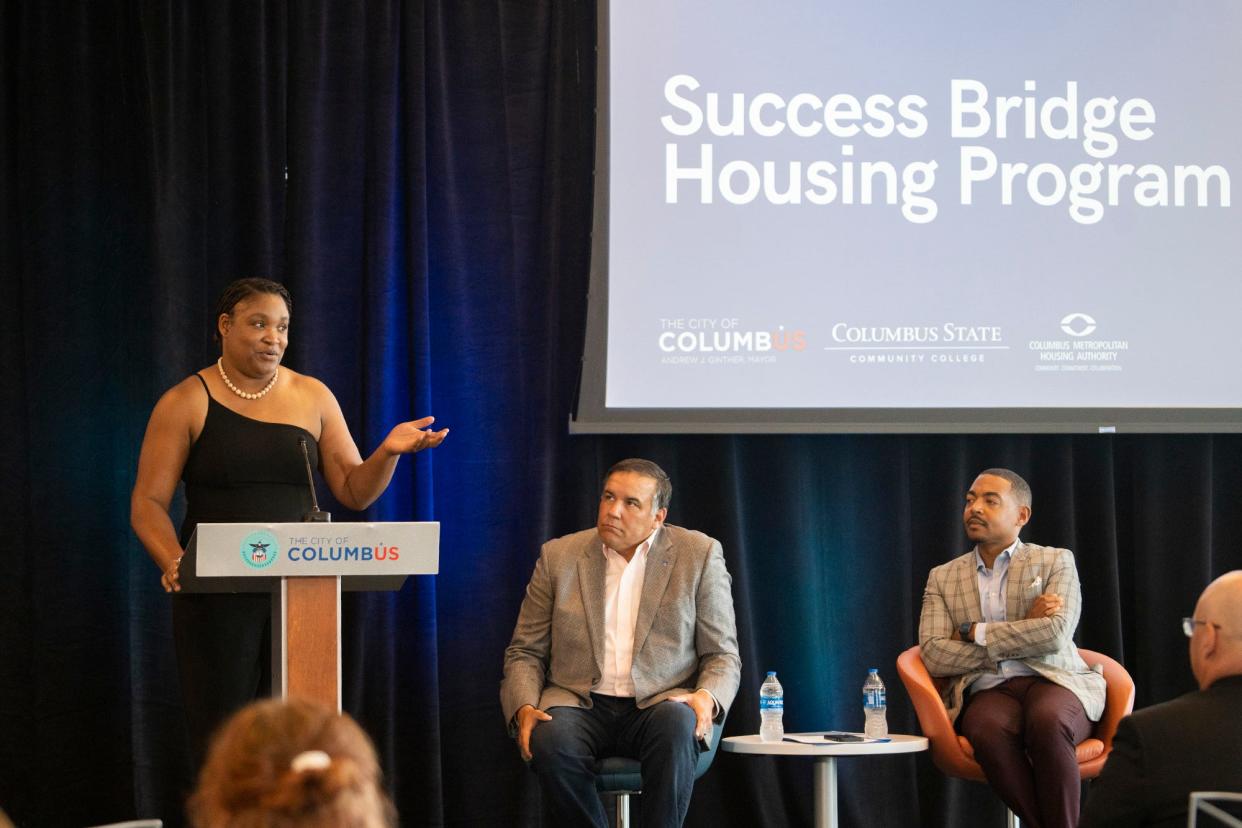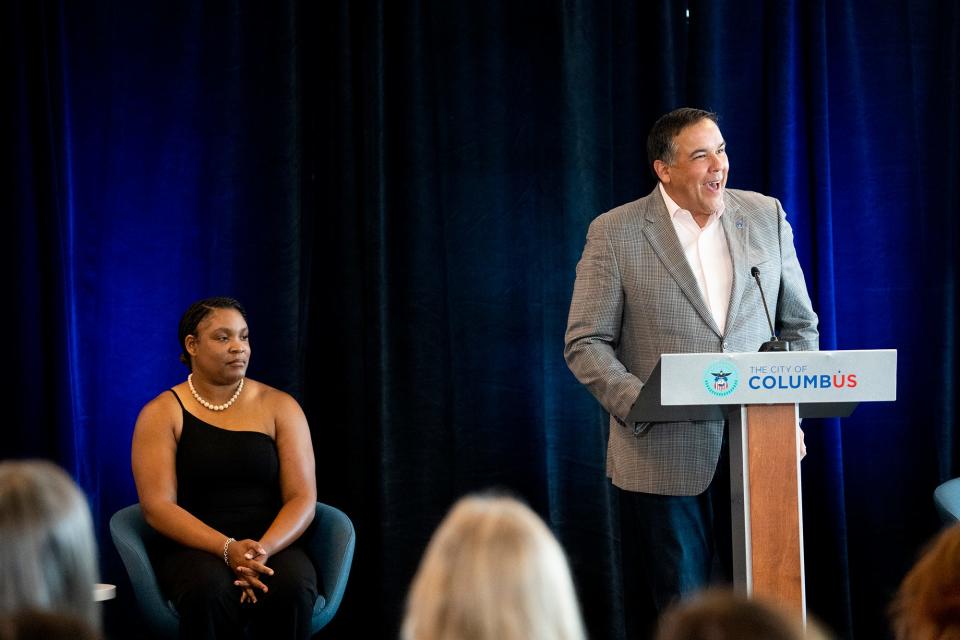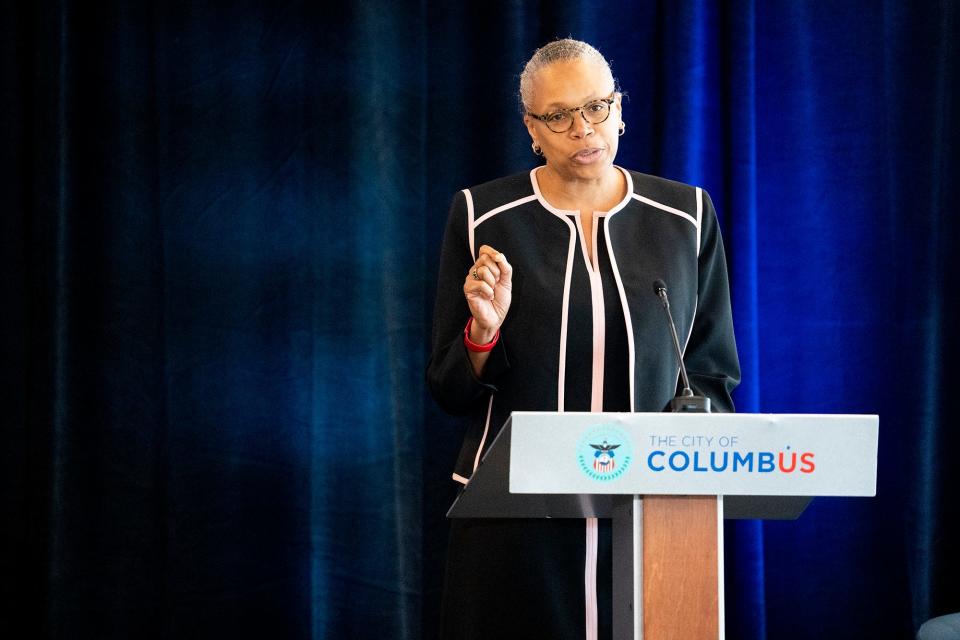City Council to give $2 million to help Columbus State students struggling with housing

- Oops!Something went wrong.Please try again later.
When TaVonna Wilson decided to enroll at Columbus State Community College in 2020, almost two decades after graduating from high school, her housing situation was top of mind.
"How do I go to school, work full time and find safe, affordable housing for my girls?" Wilson asked herself.
Wilson was able to get help through the Success Bridge Housing Stabilization program, which supports Columbus State students who face housing insecurity or homelessness. In February 2021, Wilson and her daughters moved into a three-bedroom apartment through the program, removing a burden that stops many college students from completing their degrees.
Wilson, who recently graduated with a degree in early childhood education and teaching, said she couldn't have done it without the help. Now, housing-insecure students at Columbus State, like Wilson, will be able to breathe a little easier this school year, thanks to new funding from the city to revitalize a college housing program.
Columbus Mayor Andrew J. Ginther and City Council President Shannon Hardin announced Monday the city will provide $2 million to extend Success Bridge.

College housing insecurity: Thousands of college students struggle with homelessness, housing insecurity. Why?
Tens of thousands of college students experience housing insecurity and homelessness each year in the U.S., according to the Hope Center for College, Community and Justice in Philadelphia, which conducts the annual survey. The survey found that nearly half of all college students experienced housing insecurity in 2020 and 14% of students experienced homelessness that year.
Students who were at the most risk of losing their housing, according to the report, were much less likely to enroll in college in fall 2020, when the survey was conducted and enrollment dropped nationally by about 400,000 students. The most severe enrollment declines were among those at greatest risk of basic needs insecurity: students at two-year institutions, as well as Black and Native American students.
What is Success Bridge?
Columbus State introduced the program in September 2020 to support students experiencing housing instability. It was a $1.5 million partnership between the college, the Affordable Housing Alliance of Central Ohio, Columbus Metropolitan Housing Authority, Homeless Families Foundation, the Community Shelter Board and other philanthropic organizations.
The three-year pilot program provided campus, career and community resources to students actively pursuing a degree, namely with subsidized housing. It also included help for students facing homelessness, for past-due rent payments and utility bills.
Success Bridge's housing program had two parts: It offered up to four months of short-term assistance for those in an urgent housing crisis and mid-term assistance for up to 28 months to get students through college by placing them in housing through the community partners.
But the program ended earlier this year. Now, with new funding, Success Bridge has new life, said Desiree Polk-Bland, Columbus State vice president of student affairs.
“Success Bridge has a proven record of helping our students continue their education without getting caught up in life circumstances that can take them off track,” Polk-Bland said.

'One degree at a time': Columbus Scholar House helps get student parents through college
During its initial pilot, Success Bridge provided 57 students with one-time and short-term financial assistance to help stabilize their housing situation, and 33 were placed in apartments dedicated to program participants.
All short-term assistance students and nearly 75% of the students placed in program apartments found permanent housing after completing the program.
“The city’s financial backing comes at a time of rapidly rising housing costs in a market that already lacks sufficient affordable options," Polk-Bland said. "This funding will enable us to continue the best practices in supporting housing security that we already know are successful in getting our students across the finish line to their credential, with the higher earning power and life stability that comes along with it.”
The average rent in Franklin County is about $1,253 a month, up by nearly 4% from last year and about 18% from 2019, according to an analysis by The Washington Post.
Hardin said there is a pervasive myth that poverty during college is a normal "rite of passage." That myth is not only wrong, he said, but dangerous and holds students back.

"Students more often fall behind on rent rather than tuition," Hardin said. "This is a proven way to keep people in school."
Ginther said students enrolled through the Columbus Promise initiative, which ensures Columbus City Schools graduates can attend Columbus State Community College for free, will get priority for services in this new round of funding for Success Bridge. Applications for Success Bridge are now open through Columbus State's website.
How will the city pay for Success Bridge?
Columbus City Council voted Monday to authorize $400,000 of the city’s federal Emergency Rental Assistance for housing-focused case management positions serving Columbus State students and another $1.6 million to pay housing costs for Success Bridge participants.
Success Bridge will continue with its original partners.
Ginther said Success Bridge fills an important gap in many students' higher education experience.
"In Columbus, housing should never hinder education or personal growth," Ginther said. "By guaranteeing that college students have access to safe and stable housing, we are investing in their future and empowering them to focus on their studies and dreams without the stress and fear caused by housing instability."
Hardin said this funding will eliminate the burden for housing-insecure students trying to complete their degrees.
“All of our students deserve the opportunity to advance their future without fear of financial hardship,” Hardin said.
Sheridan Hendrix is a higher education reporter for The Columbus Dispatch. Sign up for Extra Credit, her education newsletter, here.
shendrix@dispatch.com
@sheridan120
This article originally appeared on The Columbus Dispatch: Columbus State student housing program to receive $2 million from city

